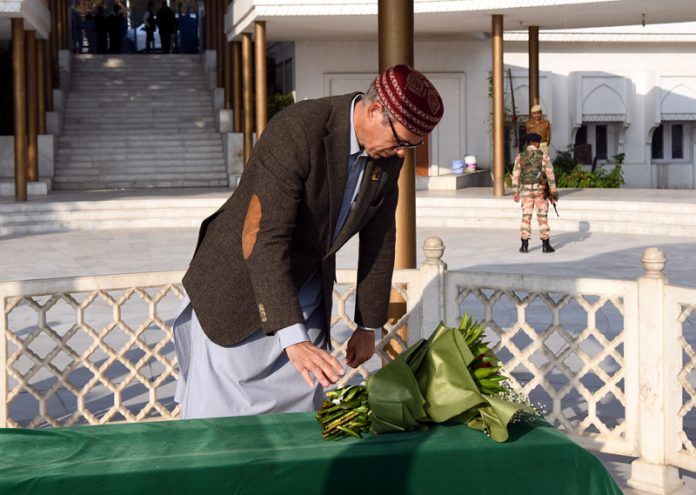
CM visits Hazratbal, Sheikh’s mausoleum
Excelsior Correspondent
SRINAGAR, Oct 16: From facing defeat in the Lok Sabha polls in June to scripting history four months later as the first Chief Minister of the Union Territory of Jammu and Kashmir after an emphatic victory in the Assembly elections, it has been quite a ride for Omar Abdullah.
Follow the Daily Excelsior channel on WhatsApp
Abdullah, 54, was sworn in as Chief Minister on Wednesday, marking the beginning of his second stint and the third generation of the influential Abdullah clan — after his grandfather Sheikh Abdullah and father Farooq Abdullah — in power.
The National Conference (NC) vice president served as Chief Minister of the erstwhile State of Jammu and Kashmir from 2009-14.
In a decisive win in the recent Assembly elections, the NC won 42 of the 90 seats that went to polls. It’s pre-poll alliance partner Congress won six. Together, the two allies have a majority in the 95-member Assembly — five members are to be nominated by the Lieutenant Governor.
Five Independents and the lone AAP MLA have also extended support to the NC-Congress alliance.
In June, Abdullah endured an embarrassing defeat in the Lok Sabha elections, losing Baramulla seat to Independent candidate Abdul Rashid Sheikh, popularly known as Engineer Rashid, by more than 2 lakh votes.
While other parties were busy gearing up for the Assembly polls, Abdullah announced he would sit out of the contest till the Centre restores Statehood to Jammu and Kashmir. He soon changed his stance and the NC fielded him from not one but two seats — Budgam and Ganderbal. He won both by comfortable margins.
With his father and NC president Farooq Abdullah easing into retirement, many were of the view that this election would define the future of the political career of junior Abdullah.
Following the abrogation of Article 370 of the Constitution and reorganisation of the erstwhile State of Jammu and Kashmir into two Union Territories in August 2019, there has been an upsurge in support for the NC, with a large chunk of voters throwing their weight behind the oldest political party of the region.
Abdullah becoming the first Chief Minister of the Union Territory of Jammu and Kashmir is not the only first of his political career.
The MBA dropout from the University of Strathclyde took the electoral plunge in 1998 and was elected to the 12th Lok Sabha at the age of 28, becoming the youngest member of the Lower House.
He was elected again in 1999 and served as Minister of State for Industries and Commerce and then MoS External Affairs in 2000, only to resign from the Council of Ministers following the Godhra carnage.
After his father passed him the baton, Abdullah lost the assembly polls from the family bastion of Ganderbal in 2002 to little-known candidate Qazi Mohammad Afzal.
He was again elected to the Lok Sabha in 2004.
Afzal’s decision as the then Forest Minister to transfer forest land to the Shri Amarnath Shrine Board in 2008 sparked massive protests. Seizing the opportunity, Abdullah made a career-defining speech in the Lok Sabha during a discussion on the situation in Jammu and Kashmir.
In Assembly elections held at the end of 2008, he wrested Ganderbal and the NC emerged as the single largest party. He became the Chief Minister at the age of 38 — one of the youngest in the country — and headed the coalition Government with the Congress.
Earlier in the day, Omar paid obeisance at the Hazratbal shrine here ahead of his swearing-in, and prayed for the peace and prosperity of the Union Territory.
Abdullah visited the shrine, which houses the holy relic of Prophet Mohammad, on the banks of the famous Dal lake here.
Locals welcomed the Chief Minister and showered toffees on him. The NC vice president also interacted with the people.
He also visited the mausoleum of his grandfather Sheikh Abdullah and grandmother nearby the shrine, and offered ‘Fatiha khawani’ (special prayers) there ahead of the swearing-in-ceremony.

